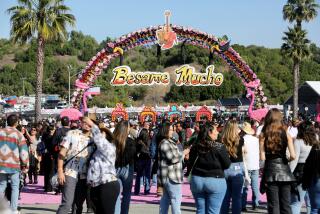Taking Brazilian music far beyond just samba
- Share via
If you think Brazilian music simply reaches from samba to bossa nova, from feathered and sequined dancers to the surging excitement of Carnaval, you should have been at the Ford Amphitheatre on Saturday night.
True to form, Brazilian Summer Festival 2006 had plenty of familiar sights and sounds, from the cute children’s ensemble Samba at Saticoy and the nubile dancers of the Oya Brazil Samba Show to the rhythmically diverse singing of Katia Moraes and her group, Pure Samba.
But Moraes’ eclectic presentation was the first indication that something more unusual was on the way. Garbed in a surprisingly rural-looking outfit, accessorized with a hat, glasses, white socks and tennis shoes, she darted across a wide spectrum of styles, from familiar samba and bossa nova to less-often heard forro, frevo and pagode. Propelling every number with her nonstop dynamism, she roved the wide Ford stage, calling out the audience, encouraging people to dance, setting the stage for what felt more like a party than a concert.
When the headliner -- Forrocacana -- arrived on stage, the transition was completed. The ensemble has been at the crest of a growing Brazilian fascination with forro, an energetic, unsophisticated -- but passionately gripping -- music from the country’s northeast.
Light years removed from the lush, subtle harmonies of bossa nova, the whiplash melodies of choro and the pervasive rhythms of the samba, forro resonates more strongly (if very differently in style) with square-dance music and mariachi.
Forrocacana’s songs generally consisted of chant-like melodies supported by repetitious rhythms. Most numbers were powerfully driven by the singing and zabumbatera (percussion) playing of Duani, enhanced by the traditional accordion sounds of Mara and the rabeca (Brazilian fiddle) of Marcos Moletta.
The dancers returned, this time garbed in rural outfits -- frilly pinafores and sneakers -- and paired off, dancing the forro in a sensual style distinctly reminiscent of the lambada.
Long before Forrocacana hit its peak, it was amply clear why forro is Brazil’s hottest musical trend. Will it have a lambada-like run in this country? Stay tuned.
More to Read
The biggest entertainment stories
Get our big stories about Hollywood, film, television, music, arts, culture and more right in your inbox as soon as they publish.
You may occasionally receive promotional content from the Los Angeles Times.










